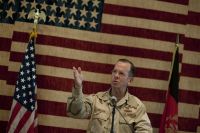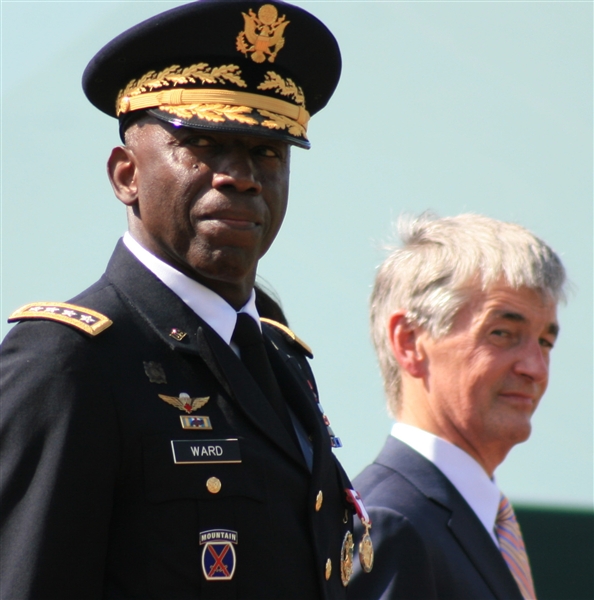KABUL, Afghanistan — The chairman of the Joint Chiefs of Staff emphasized the need for all aspects of national power to contribute to defeating extremists in Afghanistan during an “all-hands” talk today at the U.S. embassy here.
Navy Adm. Mike Mullen spoke to more than 200 employees who crowded into the main atrium of the embassy and watched from staircases and balconies. They included representatives of the more than 600 Afghan nationals who work at the embassy, as well.
Employees from the Departments of State and Justice, and the U.S. Agency for International Development, and other federal agencies work in the embassy. Many work alongside U.S. servicemembers to bring the “civil” portion to the civil-military affairs program.
Mullen thanked the embassy employees for their efforts and sacrifices at an important time in history. “You represent such a critical part of our success in ways that have evolved dramatically … over the course of this decade, in particular,” he said.
The chairman spoke in front of an Afghan-made rug depicting Jasper Johns’ famous painting of the American flag. Before speaking to the crowd, the chairman reenlisted a young Navy petty officer who works at the embassy.
Mullen said the military is needed to set conditions so other branches of government can help. Security is necessary, but it isn’t the be-all and end-all of a counterinsurgency campaign. “If we don’t have a great team like you, we can’t get there,” he said.
The chairman spoke about strengthening civilian-military cooperation over the long term. Important questions to answer, he said, are: What are the fundamentals in a campaign? How do we educate ourselves on that? How do we train ourselves on that? How do we work together before we are in a conflict?”
The increase in cooperation between civilians and servicemembers is increasing, Mullen said, naming U.S. Africa Command and U.S. Southern Command as examples where military formations are including other agency civilian employees in the basic manning documents.
“One of the problems in Iraq was generating civilian capacity in a war zone,” the chairman said. Civilian agency employees had no expectation that they would serve in a war zone. Civilian agencies did not have the manpower policies in place to identify people who would be useful in the war zones, and then train and place them.
“The future includes all of us,” he said. “It is an absolute requirement for the world we are living in right now.”
Source:
U.S. Department of Defense
Office of the Assistant Secretary of Defense (Public Affairs)

 von
von 
